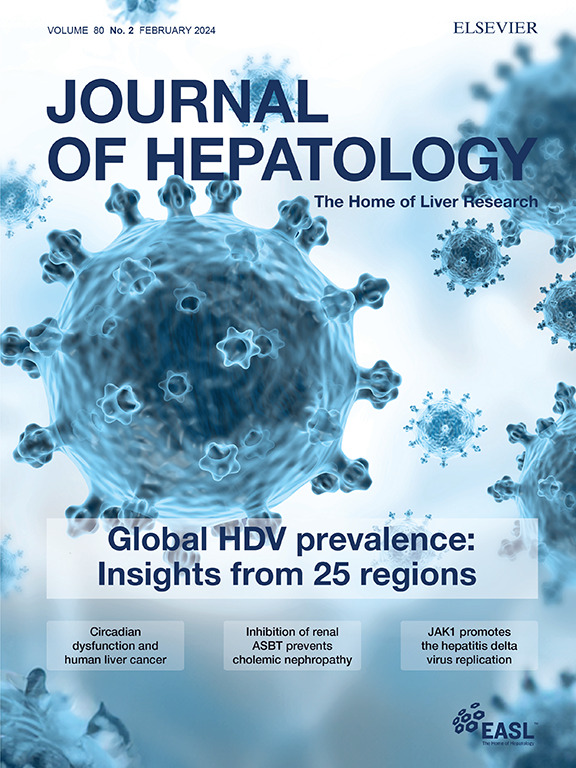Thyroid hormone receptor-β analogues for the treatment of metabolic dysfunction-associated steatohepatitis (MASH)
IF 26.8
1区 医学
Q1 GASTROENTEROLOGY & HEPATOLOGY
引用次数: 0
Abstract
The association between suboptimal thyroid function ((sub)clinical hypothyroidism or low-normal thyroid function) and the metabolic syndrome and MASLD (metabolic dysfunction-associated steatotic liver disease) has been clearly established. Furthermore, in MASLD, intracellular thyroid hormone concentrations are low and the activation of the thyroid hormone receptor (THR) is reduced. Administration of thyroid hormone has been shown to reduce liver triglycerides by stimulating fatty acid disposal through lipophagy and beta-oxidation, and to lower LDL-cholesterol. As thyroid hormone exerts its effects in many different organs, including the heart and bone, several drug candidates have been developed as selective thyromimetics for the THR-β nuclear receptor with potent and liver-targeted activity. Importantly, these compounds have reduced affinity for the THR-α nuclear receptor and tissue distribution profiles that differ from endogenous thyroid hormones, thereby reducing unwanted cardiovascular side effects. The most advanced compound, resmetirom, is an oral drug that demonstrated, in a large phase III trial in patients with MASH (metabolic dysfunction-associated steatohepatitis), the ability to reduce liver fat, decrease aminotransferase levels and improve atherogenic dyslipidaemia with a good tolerability profile. This translated into histological improvement that led to accelerated approval of this drug for active fibrotic steatohepatitis, a milestone achievement as a first MASH drug.
治疗代谢功能障碍相关性脂肪性肝炎(MASH)的甲状腺激素受体-β类似物
甲状腺功能不达标((亚)临床甲状腺功能减退症或甲状腺功能低正常)与代谢综合征和代谢功能障碍相关性脂肪肝(MASLD)之间的联系已得到明确证实。此外,在代谢性脂肪肝中,甲状腺激素在细胞内的浓度较低,甲状腺激素受体(THR)的活化程度也降低。研究表明,服用甲状腺激素可以通过噬脂作用和β-氧化作用刺激脂肪酸处置,从而降低肝脏甘油三酯,并降低低密度脂蛋白胆固醇。由于甲状腺激素在包括心脏和骨骼在内的许多不同器官中发挥作用,因此开发出了几种候选药物,它们作为 THR-β 核受体的选择性仿甲状腺药,对肝脏具有强效的靶向作用。重要的是,这些化合物对THR-α核受体的亲和力较低,组织分布特征与内源性甲状腺激素不同,从而减少了不必要的心血管副作用。最先进的化合物resmetirom是一种口服药物,在一项针对MASH患者的大型三期试验中,它被证明能够清除肝脏脂肪,降低转氨酶水平,改善动脉粥样硬化性血脂异常,而且具有良好的耐受性。这转化为组织学上的改善,导致该药加速获批用于治疗活动性纤维化性脂肪性肝炎,作为首个 MASH 药物,这是一项里程碑式的成就。
本文章由计算机程序翻译,如有差异,请以英文原文为准。
求助全文
约1分钟内获得全文
求助全文
来源期刊

Journal of Hepatology
医学-胃肠肝病学
CiteScore
46.10
自引率
4.30%
发文量
2325
审稿时长
30 days
期刊介绍:
The Journal of Hepatology is the official publication of the European Association for the Study of the Liver (EASL). It is dedicated to presenting clinical and basic research in the field of hepatology through original papers, reviews, case reports, and letters to the Editor. The Journal is published in English and may consider supplements that pass an editorial review.
 求助内容:
求助内容: 应助结果提醒方式:
应助结果提醒方式:


